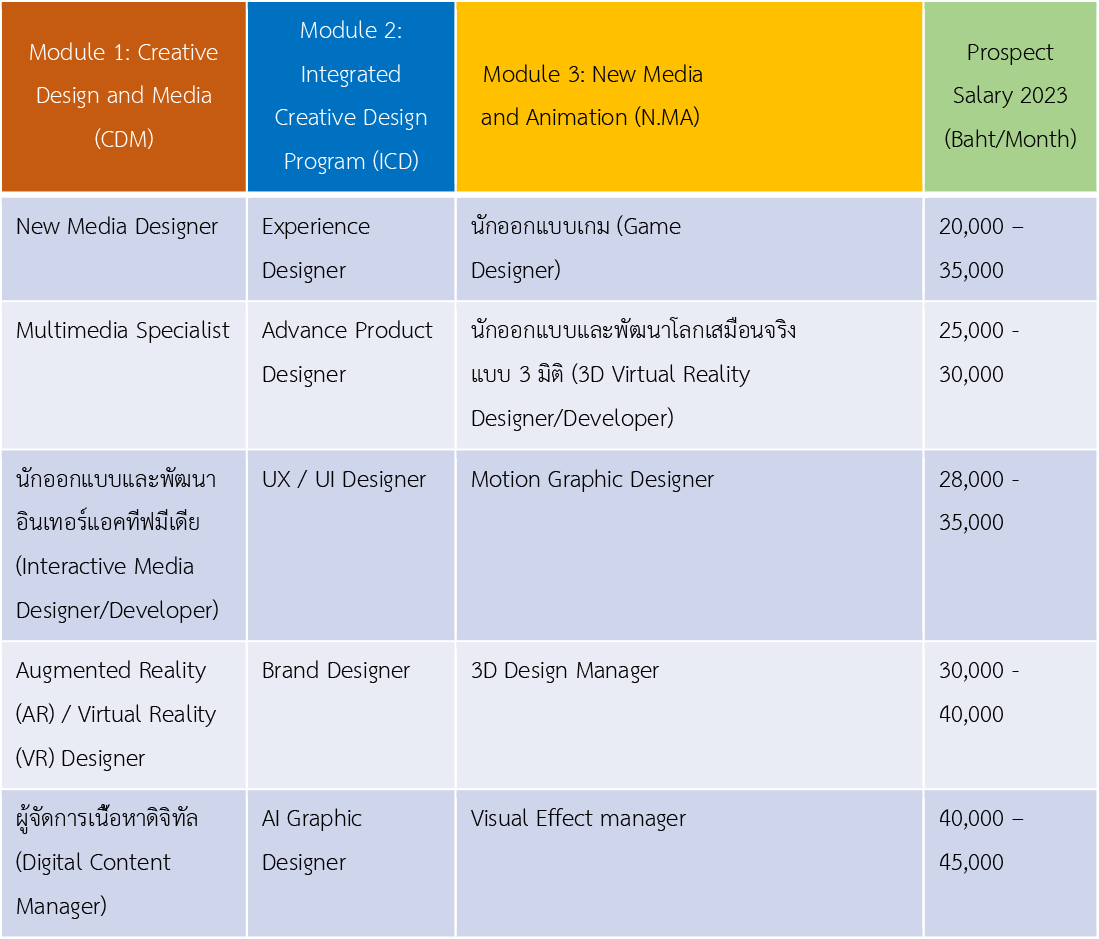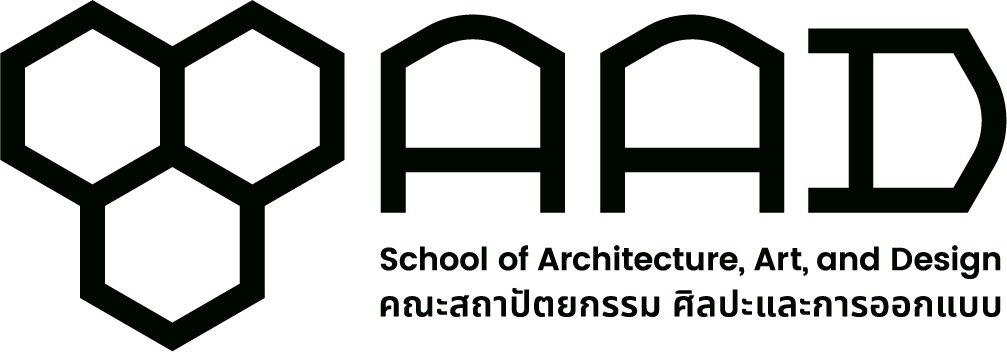BACHELOR OF DESIGN PROGRAM IN DESIGN INTELLIGENCE FOR CREATIVE ECONOMY (INTERNATIONAL PROGRAM)
Name of the Program
Name of the program (Thai) : หลักสูตรการออกแบบบัณฑิต สาขาวิชาปัญญาออกแบบเพื่อเศรษฐกิจสร้างสรรค์ (หลักสูตรนานาชาติ) (หลักสูตรใหม่ พ.ศ.2567)
Name of the program (English) : Bachelor of Design Program in Design Intelligence for Creative Economy (International Program) (New Program year 2024)
Degree and Major
Full name (Thai) : การออกแบบบัณฑิต (อบ.บ.)
(English) : Bachelor of Design (B.Des.)
Abbreviation (Thai) : อบ.บ. (การออกแบบบัณฑิต)
(English) : Bachelor of Design (B.Des.)

Format and structure of the program
Admission Plan and Estimated Graduation in 4 Years
Number of credits for the entire program 138 Credit
| A. General Subjects | 24 Credit |
| B. Major Courses | 90 Credit |
| B1. Foundation Subject | 18 Credit |
| B2. Core Subject | 30 Credit |
| B3. Module Subject | 33 Credit |
| B4. Module Subject | 33 Credit |
| C. Free Electives | 6 Credit |
| TOTAL | 120 Credit |

Philosophy, Importance and Objectives of the Program
Philosophy
The Bachelor of Design Program in Design Intelligence for Creative Economy (DICE) focuses on preparing students for success in the creative economy. It fosters interdisciplinary creativity, global awareness, technological proficiency, ethical responsibility, and a commitment to lifelong learning. The program aims to produce graduates who are skilled designers, visionary thinkers, designers, and problem solvers dedicated to creating an innovative and sustainable future. DICE promotes interdisciplinary learning and sees creativity as a core competency. It encourages students to explore various design disciplines, integrate innovative technologies, and provide hands-on learning experiences through real-world projects and internships. Additionally, it emphasizes a global perspective and offers opportunities for international experiences.
Above philosophy of DICE can be emphasized as followings.
1) Integrated & Holistic Design Mastery: The program combines Industrial and Communication Art & Design, promoting a comprehensive approach to design that encompasses user needs, market realities, cultural contexts, and technological possibilities.
2) Digital Proficiency for the Future: Emphasizing a strong foundation in digital tools, technologies, and future-focused competencies such as UX and digital literacy, students are prepared to lead in the ever-evolving digital age.
3) Practical Experience & Empowerment: Through partnerships with creative industries, students gain real-world insights and acquire marketable skills, enhancing their career prospects and earning potential upon graduation.
4) Ethical Communication & Innovation: Students learn to communicate effectively through various design mediums and leverage emerging technologies like AI and VR, all while maintaining a strong ethical foundation to ensure responsible design decisions.
5) Lifelong Adaptability & Growth: Encouraging continuous learning and instilling a mindset of perpetual curiosity, the program ensures graduates remain dynamic and lead in the shifting design landscape.


Objectives
1) To produce graduates in integrated design who can create both real and virtual worlds at an international level in correlation with the situation of the world without borders, and it also promotes the creative economy, which is one of the national strategic plans.
2) To produce graduates with skills and expertise that are recognized internationally. in a design that can be adapted to keep pace with future technology and successfully applied to the profession
3) To produce creative and innovative graduates that are in line with the vision of the institution that wants to be “The World Master of Innovation.”
Program learning outcomes
“Design Intelligent for Creative Economy”; DICE, is the course focusing on the multidisciplinary approach that leverages design thinking and practices to enhance the value, innovation, and user experience within the creative industries. It acknowledges the economic importance of creativity and cultural expression while applying design principles to achieve success in these sectors. This program learning outcomes cover four domains: (1) knowledge,(2) skills, (3) ethics, and (4) character.

Target careers for graduates according to 3 core modules

Admissions requirements
To be eligible for admission into the program, applicants must meet the admissions requirements specified in the Regulation of King Mongkut’s Institute of Technology Ladkrabang on Undergraduate Study B.E. 2565 (Appendix A). In general, they must have graduated from a high school/secondary school that is of an equivalent level to Mathayom 6 or have obtained a qualification that is equivalent to Mathayom 6 or be transferring from another program of study in some other higher-education institution that is of an equivalent level to this program. Applicants must also satisfy all other specific requirements as stated in the admissions announcements for this program.

